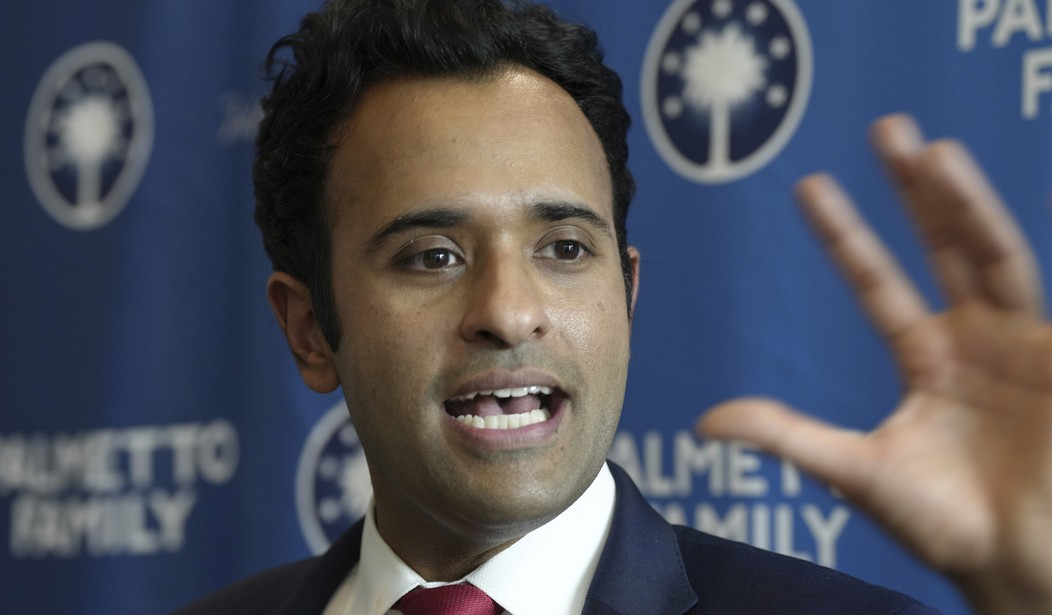Vivek Ramaswamy, who is running for the Republican Party’s presidential nomination, has presented an awe-inspiring proposal: Raise the voting age to 25, a brilliant strategy to alienate younger voters by suppressing their voices. However, while some have lauded his new proposal, others have pointed out why the idea is about as nutty as letting Joe Biden babysit your kids.
Ramaswamy has called for establishing a policy he calls “Civic Duty Voting,” which would offer three avenues for 18-year-olds to be allowed to vote. The first would be serving six months in the United States military or as a first responder. The second is passing the same civics test that immigrants take to become U.S. citizens. If one does not choose either option, they will have to wait until they turn 25 to vote.
“We must be ambitious,” Ramaswamy tweeted last Thursday. “I understand not everyone will like this proposal and that it will take persuasion to convince many of its merits, but I’m ready to take that on.”
We’re not a direct democracy. We are a *constitutional republic.* We need to revive civic duty among young Americans. That’s why I’m announcing my support for a constitutional amendment to raise the voting age from 18 to 25, but to still allow 18-year-olds to vote if they either… pic.twitter.com/mdbSta5McK
— Vivek Ramaswamy (@VivekGRamaswamy) May 12, 2023
Ramaswamy argued that tying voting to civic commitments has long been part of American national culture. His campaign believes that using the government to enforce these values could instill a sense of shared purpose and responsibility among young citizens to be informed of civics.
His campaign pledged that the amendment would not require creating yet another government agency. However, achieving the proposal would require a constitutional amendment rather than an executive order or legislation. Ramaswamy insisted that the initiative is needed due to the absence of national pride and a severe threat to the future of the country.
Ramaswamy’s proposal has been controversial, with some arguing that it would disproportionately affect marginalized communities and reduce voter turnout. Critics claim that the initiative is a form of voter suppression and that it would make it more difficult for young people, especially those from disadvantaged areas, to participate in the democratic process. Others have expressed concern about tying voting rights to military service, arguing that it undermines the notion of a free and fair process for choosing the nation’s leaders.
The candidate’s proposal might seem attractive to some. But there are some serious flaws with Ramaswamy’s idea.
The idea of linking civic duty to voting rights fails to consider the inherent rights and responsibilities of young adults. This article will argue against the proposal, highlighting the inconsistencies, potential consequences, and the uphill battle it faces in gaining support.
Raising the voting age to 25 disregards the fact that young adults are allowed to undertake other significant responsibilities before reaching this age. It makes little sense to allow individuals to drive, serve in the military, and even consume alcohol at a younger age while denying them the right to have a say in the apparatus governing them. This inconsistency undermines the credibility of this proposal and fails to provide a rational basis for raising the voting age.
Secondly, using the government to suppress votes contradicts the principles of a Constitutional republic. The idea of restricting voting rights for adults based on age is an attempt to curtail the democratic process, depriving younger adults of their fundamental right to participate in shaping the future of their nation.
There is no valid reason to bar younger adults from exercising their right to vote. This proposal unfairly targets a specific age group without sufficient evidence or justification. It suggests Americans in this age range are too stupid to vote. This might not be an inaccurate assumption for many, but this issue does not go away once someone reaches the age of 25.
Passing a constitutional amendment to bar younger voters faces significant hurdles. Amending the Constitution is intentionally challenging, requiring broad consensus and support from most states. Given the importance of young adult voters and their potential impact, it is improbable that such an amendment would garner the necessary support. Instead of wasting time and resources on an impractical endeavor, Republicans would be wise to actually do what they have failed to do in the past: Make a genuine effort to win younger voters, which leads me to my next point.
Embracing this idea risks alienating and further distancing the Republican Party from younger Americans. The proposal sends a message that the party is more interested in suppressing the voices of young voters than addressing their concerns and earning their support. With younger generations becoming increasingly influential in shaping the political landscape, Republicans risk further marginalizing themselves by advocating for policies that hinder the democratic participation of younger adults.
To sum it up, Ramaswamy’s proposal to raise the voting age to 25 is a masterstroke in alienating and undermining the younger generation for no valid reason. With impeccable disregard for consistency, democratic principles, and the future of the Republican Party, this proposal will undoubtedly leave a lasting impression on the minds of young Americans. If Republicans want to win, they’d best not run with Ramaswamy’s idea.














